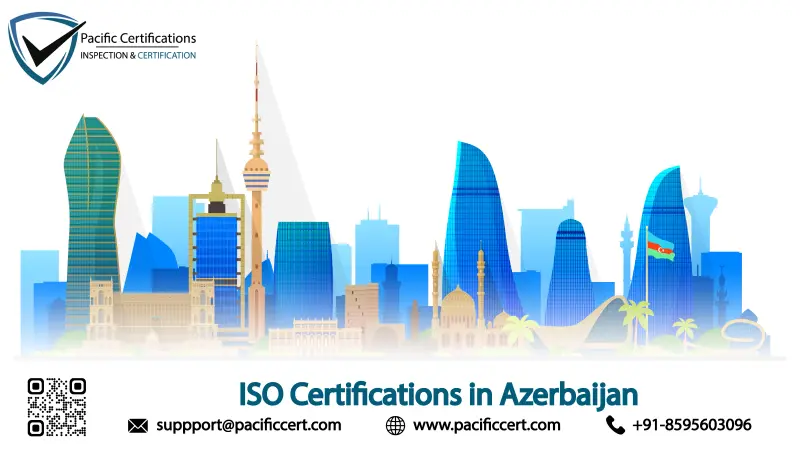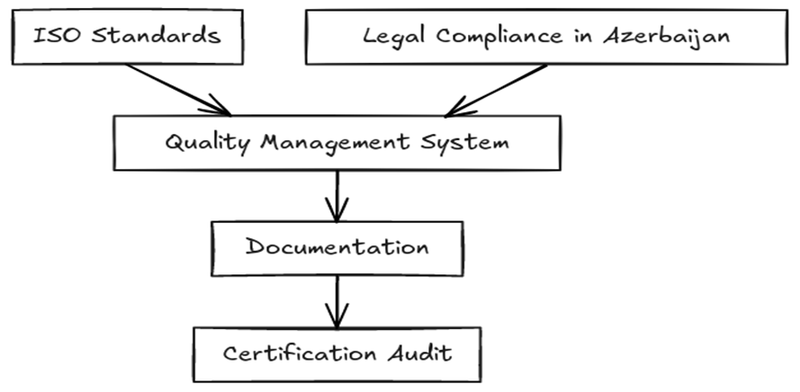ISO Certifications in Azerbaijan, Popular Standards, Requirements and Benefits

Introduction
Azerbaijan’s economy is anchored by oil-and-gas and pipelines, petrochemicals, construction and public works, logistics corridors, food and agrifood processing, textiles, metals and a growing base of banking, fintech and cloud-based services. Across these sectors, ISO certification in Azerbaijan is increasingly used to show that quality, safety, environmental performance, information security and food safety are under control, not left to chance.
For oil-and-gas operators, EPC contractors, construction and infrastructure firms, manufacturers, agrifood processors, logistics providers, hospitals, labs, banks and ICT companies, ISO 9001, ISO 14001, ISO 45001, ISO 22000 and ISO 27001 are now common vendor and lender expectations rather than nice-to-have labels. ISO 9001 certification in Azerbaijan and integrated ISO 9001, ISO 14001 and ISO 45001 certification services help organizations keep a stable baseline while supply chains and project loads shift.
Share your scope and sites in Azerbaijan with Pacific Certifications and we will map accreditation coverage, recommended audit days and Stage 1 and Stage 2 windows that match your project cycle, export seasons and any integrated ISO certification plans across ISO 9001, ISO 14001, ISO 45001, ISO 22000 and ISO 27001.
Economic context and industry overview
Azerbaijan continues to position itself as a regional energy, logistics and manufacturing hub, with strong links to Europe, Central Asia and the Middle East. Oil-and-gas and pipeline operations still drive much of the foreign-currency earnings, but non-oil sectors such as construction, building materials, agrifood exports, textiles, tourism, banking and digital services are gaining more attention.
As new pipelines, ports, industrial parks, logistics hubs and technology zones come online, buyers and regulators are asking clearer questions about quality management, environmental impact, health-and-safety on sites, food safety in chains, cyber-security in IT services and reliability in banking, fintech and cloud platforms. ISO certification in Azerbaijan gives ministries, investors and international customers a shared language when they screen local partners for long-term contracts.
Why ISO certifications matter in Azerbaijan?
Large buyers, lenders and public bodies now expect structured systems with records they can review, not just policy statements or marketing slides. ISO certification in Azerbaijan helps teams move faster through RFIs and tenders, pass supplier audits and give project owners confidence that sites, lines and platforms are under steady control.
ISO 9001 supports process control, supplier oversight and change-control for oil-and-gas and energy companies, EPC and construction firms, manufacturers, textiles and light industry, logistics providers and service organizations. ISO 14001 and ISO 45001 strengthen EHS discipline on project sites, terminals, yards, plants and workshops. ISO 22000 supports food safety and HACCP planning for agrifood, retail and hospitality, while ISO 27001 information security certification supports banks, fintechs, telecom and data-center operators in protecting data and uptime.
When ISO certification requirements in Azerbaijan are met and maintained, organizations can show buyers that they understand risk, keep records and take corrective action instead of reacting to each incident in isolation.
Popular ISO standards in Azerbaijan
Certification process in Azerbaijan
The ISO certification process in Azerbaijan starts with a realistic view of how work runs today in plants, projects, offices, call-centers and digital platforms. The aim is to build an auditable system without forcing people to keep two different versions of the truth. Below are the steps to consider if you want to get ISO certified in Azerbaijan:
List products, services, sites, headcount and high-risk processes so the scope is clear and audit-time is realistic for oil-and-gas, construction, manufacturing or service operations.
Map processes end-to-end so inputs, handoffs, records and responsibilities are visible from suppliers through to customers, regulators and lenders.
Set policy and measurable objectives linked to customer needs, export conditions, legal requirements, safety topics, food safety, cyber-security and energy use.
Schedule Stage 1 for readiness checks and Stage 2 for implementation verification, align multi-site sampling to risk and location and agree how much can be done on-site and how much remote.
Close any findings within agreed timelines and keep evidence organized so future surveillance audits are predictable rather than crisis-driven.
What are the requirements of ISO certifications in Azerbaijan?
ISO certification requirements in Azerbaijan should follow how work actually runs in oil-and-gas and power assets, construction and EPC projects, workshops and factories, warehouses and cold-rooms, clinics and labs, call-centers and data-rooms so records hold up in audits and buyer reviews. Below are the key requirements:

Scope aligned to products or services, processes and sites, including multi-site programs and contractor parks where work is shared or outsourced.
Controlled documents and records that match practice, with clear version-control, access rules and change-history so users are never unsure which instruction applies.
Risk assessment with operational controls for real hazards and issues such as process-safety, contractor work, HACCP, emissions, spills, cyber threats, privacy, energy use and change-management.
Standard-specific artifacts such as HACCP plans and CCP logs for ISO 22000, Statement of Applicability and risk files for ISO 27001, hazard registers and permit-to-work records for ISO 45001, aspect-impact registers and objectives for ISO 14001 and energy reviews and energy performance indicators for ISO 50001.
Legal and other requirements register with permits, inspections, calibrations, monitoring data and supplier compliance proofs that relate to safety, environment, labor, food, health, finance, telecom and data protection.
Tip: align your controls with sector ministries, state oil and energy rules, construction and labor codes, food and veterinary rules, financial and telecom regulations and any buyer or lender clauses in contracts.
What are the benefits of ISO certifications in Azerbaijan?
ISO certification in Azerbaijan should help you move quicker through tenders and vendor onboarding, reassure lenders and partners and keep work steady despite shifts in demand, inputs or project timing. Below are the key benefits:
Faster pre-qualification in buyer portals and public procurement for energy, EPC, construction, logistics, manufacturing, agrifood, healthcare and services.
Fewer incidents, defects and stoppages on sites, lines, terminals and transport routes, which cuts rework, downtime and claims.
Clear roles and skill-paths for operators, technicians, engineers, planners, HSE staff, IT teams and managers across shifts and locations.
Traceable data for investigations, recalls, warranty and cargo claims, insurance, ESG summaries and due-diligence by investors and partners.
Stronger supplier and contractor control through audits, KPIs and corrective actions across transport, maintenance, cleaning, waste, utilities, IT and cloud providers.
Measured gains in energy use, waste, emissions, uptime and yield at plants, terminals, warehouses, workshops and data-centers.
Clearer signals of reliability and discipline for buyers in the region and worldwide who compare ISO status across competing vendors.
Demand for ISO certification in Azerbaijan is rising as more projects link to cross-border pipelines, transport corridors, special economic zones and digital platforms. Oil-and-gas and energy companies are aligning with ISO 9001, ISO 14001, ISO 45001 and ISO 50001 for project assurance, site EHS and energy performance. Ports, logistics operators and warehouses see growing interest in ISO 9001, ISO 14001, ISO 45001, ISO 28000 and ISO 22301 to support chain-security and continuity.
Banks, fintechs and telecom providers increasingly seek ISO 27001 information security certification with ISO 22301 for continuity and ISO 20000-1 for IT service quality. Agrifood and cold-chain exporters focus on ISO 22000 and ISO 9001 to protect market access, especially where buyers expect strong food safety and traceability.
Challenges faced in Azerbaijan
Local conditions can make ISO work difficult if teams are not supported. The main challenges are:
Budgeting time and funds for certification and system upkeep when project cycles, financing, exchange-rates and day-to-day operations all compete for attention.
Treating ISO as paperwork in some teams, which slows adoption and leaves gaps between procedure and practice on sites and lines.
Shortage of trained internal auditors and process owners who can connect ISO clauses to real risks on pipelines, construction sites, plants or digital platforms.
Gaps in document-control, internal audits, corrective-action discipline and record-keeping across multi-site and multi-vendor networks.
Complex supply chains and joint-venture structures that make it harder to gather evidence and keep controls consistent from tier 1 to tier 3.
What is the cost of certification in Azerbaijan?
ISO certification cost in Azerbaijan depends on headcount and risk, the number and spread of sites, your standards set, whether the program is single-standard or integrated such as ISO 9001, ISO 14001 and ISO 45001, sampling depth for plants, terminals, depots, warehouses, clinics, offices or data-centers and the mix between on-site and remote audit work.
For many small to medium enterprises in Azerbaijan, ISO 9001 certification cost depends more on employee numbers, process complexity and single-site versus multi-site scope than on revenue. The same logic applies when adding ISO 14001, ISO 45001, ISO 22000 or ISO 27001.
Your proposal from Pacific Certifications will itemize Stage 1, Stage 2 and surveillance days, explain on-site versus remote activities and highlight any multi-site efficiencies so leadership and finance teams can plan clearly. For a personalized ISO certification cost estimate in Azerbaijan, contact [email protected] and request an ISO 9001 certification cost estimate for your operations.
What is the timeline for certification in Azerbaijan?
Timelines depend on document and record readiness, the speed of closing Stage 1 findings, single versus multi-site scope and whether the program is single-standard or integrated. Planning around shutdowns, project milestones, export seasons, financial year-end and key customer audits also shapes the schedule.
A prepared single site such as one plant, depot, office, lab, data-center or hospital can often move from application to decision within one audit cycle. Multi-site or integrated programs that combine ISO 9001, ISO 14001 and ISO 45001, or add ISO 22000 or ISO 27001, need more sampling and planning time, especially where sites sit in different regions or involve joint-venture partners and complex logistics.
Important standards often requested by buyers in Azerbaijan
How Pacific Certifications can help?
Pacific Certifications audits and certifies ISO management systems for oil-and-gas and energy, construction and EPC, ports and 3PLs, manufacturing and engineering, textiles and garments, agrifood and cold-chain, healthcare and labs, banks and fintech, telecom, cloud and service organizations across Azerbaijan. We provide ABIS-accredited third-party ISO certification with transparent pricing and a team used to plant-floor, project-site and control-room realities as well as buyer and lender questions.
Our certificates are accepted by procurement portals and international customers. We support single-standard and integrated ISO certification programs, including ISO 9001, ISO 14001, ISO 45001, ISO 22000 and ISO 27001, and we align audit plans with your project and export calendars.
Request your ISO 9001, ISO 14001, ISO 45001, ISO 22000, ISO 27001 or integrated ISO audit plan and fee estimate. We will help you map Stage 1 and Stage 2 timelines and evidence needs for your organization. Contact us at [email protected].
Accredited training programs
Pacific Certifications provides accredited training programs in Azerbaijan for ISO 9001, ISO 14001, ISO 45001, ISO 22000, ISO 27001, ISO 22301 and ISO 20000-1.
Lead auditor training: for professionals who audit these systems in Azerbaijani organizations.
Lead implementer training: for personnel who build or improve systems in plants, terminals, warehouses, hospitals, labs, utilities, banks, telecom and digital platforms.
These programs can run online or on-site, depending on client needs, under personnel-certification requirements. To begin the process or request a quotation, contact [email protected].
Contact Us
If you need support with ISO Certifications in Azerbaijan, contact us at [email protected] or +91-8595603096.
Read More at: Blogs by Pacific Certifications

